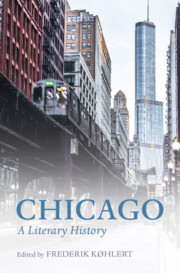Book contents
- Chicago: A Literary History
- Chicago
- Copyright page
- Contents
- Figures
- Contributors
- Acknowledgments
- Introduction: The Literary History of Chicago
- Part I The Rise of Chicago and the Literary West
- Chapter 1 From Prairie to Metropolis: Chicago as the American “Shock City”
- Chapter 2 Birth, Fire, and Rebirth: Edward Payson Roe’s Barriers Burned Away and the Invention of Chicago Literature
- Chapter 3 “This Broad, Free Inland America of Ours”: Hamlin Garland, Chicago, and the Literary West
- Chapter 4 White City: The World’s Columbian Exposition in Literature
- Chapter 5 New Realities, New Realisms: Chicago Literature against the Genteel Tradition
- Part II Business Unusual: A New Urban American Literature
- Part III Radicalism, Modernism, and the Chicago Renaissance
- Part IV A City of Neighborhoods: The Great Depression, Sociology, and the Black Chicago Renaissance
- Part V Traditions and Futures: Contemporary Chicago Literatures
- Selected Bibliography
- Index
Chapter 3 - “This Broad, Free Inland America of Ours”: Hamlin Garland, Chicago, and the Literary West
from Part I - The Rise of Chicago and the Literary West
Published online by Cambridge University Press: 02 September 2021
- Chicago: A Literary History
- Chicago
- Copyright page
- Contents
- Figures
- Contributors
- Acknowledgments
- Introduction: The Literary History of Chicago
- Part I The Rise of Chicago and the Literary West
- Chapter 1 From Prairie to Metropolis: Chicago as the American “Shock City”
- Chapter 2 Birth, Fire, and Rebirth: Edward Payson Roe’s Barriers Burned Away and the Invention of Chicago Literature
- Chapter 3 “This Broad, Free Inland America of Ours”: Hamlin Garland, Chicago, and the Literary West
- Chapter 4 White City: The World’s Columbian Exposition in Literature
- Chapter 5 New Realities, New Realisms: Chicago Literature against the Genteel Tradition
- Part II Business Unusual: A New Urban American Literature
- Part III Radicalism, Modernism, and the Chicago Renaissance
- Part IV A City of Neighborhoods: The Great Depression, Sociology, and the Black Chicago Renaissance
- Part V Traditions and Futures: Contemporary Chicago Literatures
- Selected Bibliography
- Index
Summary
In the decades around the turn of the twentieth century in which the writer, literary theorist, and activist Hamlin Garland lived in Chicago, he made great efforts to make the city the center of American literature. While later readers categorized his work simply as Midwest regionalism, Garland believed that regionalist literatures constituted global avant-gardes and that developing regional literary centers would lead to a transformation of literary value. This chapter surveys Garland’s work across thirty years, examining his theory of literary localism, his investment in developing the Chicago literary and artistic world, his changing vision of the American West, and his deflected relationship to early American modernism. In addition to his most famous writings, Main-Travelled Roads and Crumbling Idols, the chapter discusses less well-known works including The Land of the Straddle-Bug, Rose of Dutcher’s Coolly, his writings on Alaskan mining and Native American reservations, and his biography of U. S. Grant. It also explores his affiliations with Chicago personalities including Henry Blake Fuller, Harriet Monroe, and the influential Chicago magazines the Chap-Book and Poetry.
Keywords
- Type
- Chapter
- Information
- ChicagoA Literary History, pp. 44 - 57Publisher: Cambridge University PressPrint publication year: 2021

